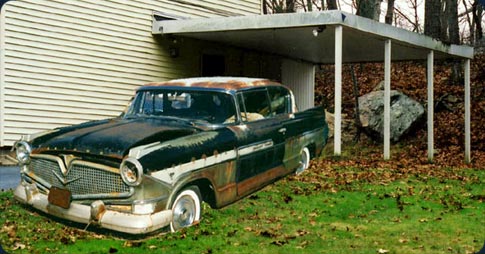High Fashion Volvo
Some of us consider old cars to be legitimate lawn sculpture, although spouses and neighbors tend to disagree. A few merchants, however, appreciate the attention-getting properties of cars, like this "clothes horse" Volvo in front of the Fat Hat Factory in Quechee, Vermont.
At first glance I considered this Volvo, the station wagon version of the PV544 series, to be a 545 (since the wagon equivalent of the earlier PV444 was a 445). As in all life, the truth is more complicated. According to "Professor Volvo" Duncan LaBay of the Round Fender Register, a harbor for fanciers of pre-perpendicular Volvos, this style, introduced in the autumn of 1960, is known as a P210 - for reasons known only to some long-gone Swedish product planners. The wagons were known as "Duetts" in Sweden, because of their dual purpose (passengers and cargo) nature.
Duncan says that some 95,000 Duetts of all descriptions were built, but only a few were imported to the US. The P210 was built until 1969, and the last ones to come to America, 1968-9, were imported privately.
The Fat Hat car is well known to the Round Fender crowd, having been restored in Sweden in the early 1980s and privately imported to Virginia. It has been serving display duty on Route 4 in Vermont for about fifteen years, and the rust planted by Vermont winters is quietly working its deadly magic.
Interestingly, the Duett, a better-cosseted example of which is in a New England collection, shares with the fiberglass-bodied P1900 Volvo Sport (rear view) the distinction of being the only postwar Volvo passenger cars with body-on-frame construction.

